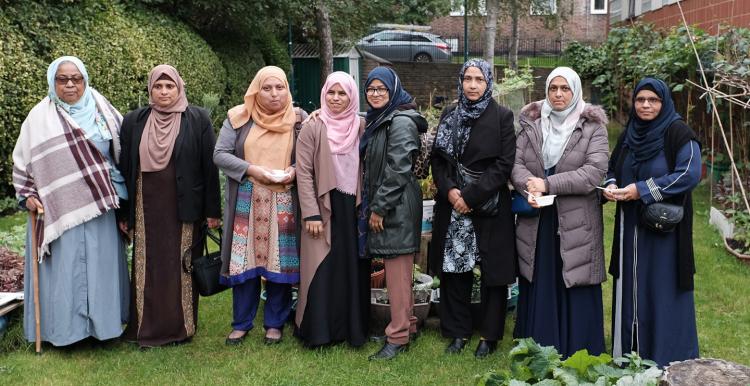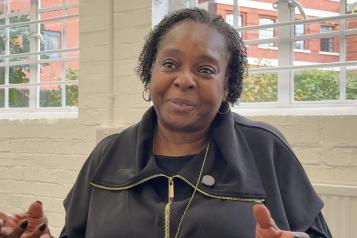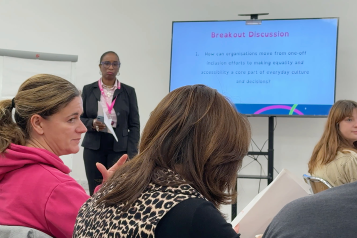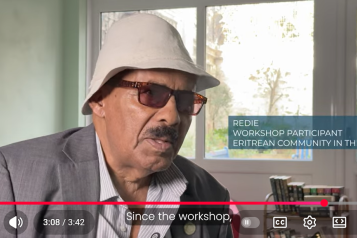Local residents share their views on mental health support services

Women from Islington's Bangladeshi community at the Barnsbury Community Garden project
I wish that I'd known about this service earlier. I had to deal with my loss alone for such a long time.
Fabiha* is from the local Bangladeshi community. She has been suffering from depression for a very long time. It got worse when her husband passed away. She became extremely reclusive and even stopped speaking.
For months, Fabiha refused to leave her home. She went unseen by family for days on end. Eventually, they coaxed her into going to see her GP. However, she didn’t open up about her situation and how she was feeling. This made it difficult for the GP to help her. She was referred to CCIWBS (Camden City Islington Westminster Bereavement Service), where she received counselling. She also accessed the ICOPE service, which offers short term talking therapy to help clients develop strategies for tackling patterns of unhelpful thoughts and behaviours. Both services were supportive. Despite this, Fabiha remained largely withdrawn.
'CCIWBS helped me get over the loss over my husband over time even though I wasn’t a very easy person to deal with. I wish that I'd known about this service earlier. I had to deal with my loss alone for such a long time. I think they should advertise their services in GPs and hospitals more.
'ICOPE helped me understand that my depression was not something to be ashamed of and that the staff there would not judge me because of it. At the time, I believe that I made things harder for myself even though ICOPE were doing their best to help me.'
During this time, a family member suggested that she go to the Maya Centre because there were Bengali speakers there and, after a bit of convincing, she attended the service. She remained quiet during her sessions until she became comfortable with one of the female counsellors and began speaking to her about her worries and problems. It took many sessions before Fabiha was able to open up. When she eventually did, she got the help that she needed.
'I was glad that there were Bengali speakers there and that it was easy for me to understand what they said to me. The counselling I received was really helpful and it was here that I started communicating again. My counsellor was extremely kind and I could trust her with all my problems because I knew she would help me. Having a woman counsellor was beneficial to me because I am usually nervous around men. I believe I would’ve stayed reclusive for longer if not for my counsellor being a woman.'
Fabiha still suffers from depression, but thanks to the counselling she has received, she now has coping mechanisms which she can employ. She still tends to seclude herself when her depression becomes too much to handle, and it then takes a while for her to become comfortable enough to leave her house again. However, she is doing much better than she was two years ago. She has also recommended these services to her friends and family in the hope that they can benefit from them as much as she did.
*Fabiha's name has been changed
Feedback from Islington Bangladesh Association
- Many of the clients they refer to ICOPE stop going after the first or second appointment. Some clients find it difficult to understand the value of speaking to somebody about how they are feeling (as opposed to being prescribed medication). This is a real barrier.
- Many of the questions that a therapist needs to ask are complex concepts to get across in the Bengali language, and also need to be asked very sensitively. This can be a challenge for time limited services such as ICOPE.
- Counselling is often offered in English. Clients have been told that they needed to wait a lot longer if they wanted a Bengali interpreter.
- Talking therapies and counselling services informed by an Islamic perspective are really important. The Muslim Council of Great Britain and East London Mosque follow this model. A lot of people really want to benefit from interventions that will improve their health, like counselling, but would like them to be offered within the framework of Islam.
Find out more
We also heard from Algerian, Arab, Eritrean, Ethiopian, Greek Cypriot, Kurdish, Latin American, Turkish, Somali, and Syrian residents and we spoke to staff members from the organisations that provide support to members of these communities.
Read the full report to learn more about our findings.


